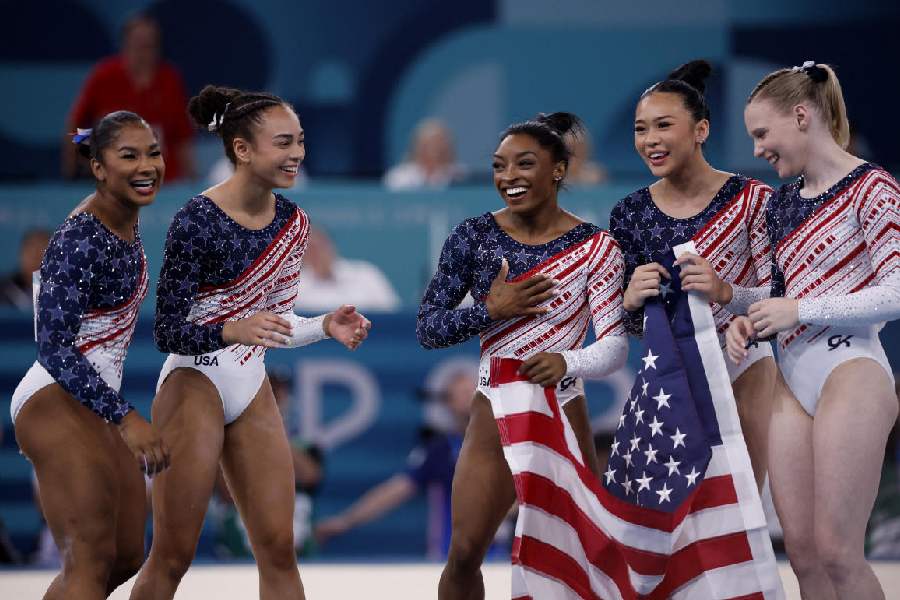Simone Biles is a different person than the one who abruptly pulled out of the Tokyo Games three years ago amid a mental health crisis, her teammates said, and it showed as she led the US to the team gold medal at the Paris Olympics on Tuesday.
Standing at the end of the runway before her vault, Biles said she was not haunted by the memories of her tumultuous time in Tokyo and was soon soaring high as she executed the Cheng vault that helped lift the US into a lead they would not relinquish.
“After I finished vault I was relieved because phew, there were no flashbacks or anything,” Biles, cementing her legacy as the greatest American gymnast and one of the best athletes in the history of the Olympics, told an overflowing press conference.
When Biles abruptly quit the Olympic team final in Tokyo, withdrawing with the “twisties,” a dangerous gymnastics condition involving a temporary loss of spatial awareness, she opened a conversation on athlete mental health.
As she nailed her vault on Tuesday, she knew the Americans were destined to reassert their gymnastics supremacy on the world’s biggest stage.
“It was super exciting,” said an ever-smiling Biles, who was seen breaking into some dance moves with teammate and close friend Jordan Chiles on the sidelines.
“I was thinking hallelujah, no flashbacks, no nothing,” Chiles, proud to witness Biles’ growth, said with a laugh.
“You can definitely tell that she’s a different person from Tokyo than she is now,” she said. “I always love to say I train with the GOAT of all GOATs.”
Everyone expected the leaders of this star-laden team to finish atop the medal
stand, but a night before the team final, something wasn’t right. There was tension in the air.
Biles, Chiles and Sunisa Lee had all been in the Olympic spotlight before, with medals and scars — physical, psychological or both, that heal but never really go away — aplenty.
In a different time, in a different era, the tension might have festered. Might have followed them onto the floor at Bercy Arena and into the history books, too.
But this is not a different time.
So the oldest team the US has ever sent to the Olympics, including a trio that have spent their respective careers breaking barriers about what a female gymnast can and can’t do, did something they never used to do.
They talked, with Biles right in the middle of it. “I think there was a little bit of struggle,” she said. “So it was really needed.”
After Tokyo, the star gymnast had gone on a two-year break from the sport to focus on herself and has since reemerged happier, healthier and better than ever.
“I started off with therapy this (Tuesday) morning and I told her (the therapist) I was feeling calm and ready. And that’s exactly what happened,” she said later.
By the time the star US team walked onto the floor for the Olympic final, the tension was gone, largely replaced with joy.
The self-described ‘Redemption Tour’, the moniker given to a team filled with women who wanted to return to the Games for deeply personal reasons, ended with Biles and the Americans where they have almost always been since she burst onto the scene 11 years ago: on top of the podium, the rest of the world looking up.
Eight years after winning gold in Rio with a team that called Aly Raisman grandma because she was all of 22, Biles — now 27 and married — was back with Jade Carey (24), Chiles (23), Lee (21) and teenager Hezly Rivera at her side.
“We don’t have to be put in the box anymore,” Biles said about a group that has dubbed itself “The Golden Girls”.
No, they don’t.
The Americans remain peerless, if not flawless, when at their best — their total of 171.296 was well clear of Italy and Brazil.
And over two hours in front of a crowd that included everyone from tennis great Serena Williams to actresses Natalie Portman and Nicole Kidman, Biles left little doubt about anything.
Her status as the sport’s greatest of all time. Her ability to move past the “twisties” that derailed her in Japan. Her spot in the pantheon of the US Olympic movement.
She now has a staggering 38 medals in major international competitions. Eight of those have come under the Olympic rings, moving her past Shannon Miller for the most by an American gymnast.
The big favourite for Thursday’s all-around final, Biles could claim her ninth Olympic medal, coming into the event after qualifying for the final by a healthy margin.
Yet her return wasn’t so much about winning. That’s never really been the point anyway, just a byproduct of her unparalleled excellence. It was about a joy she had lost somewhere along the way.
It seems to have returned. She leaned into the crowd that roared at every flip, every leap and, yes, every twist.
With her husband Jonathan Owens — on break from NFL training camp — waving an American flag while sitting next to her parents, Biles did what she has done so well for so long save for a couple of difficult days in Japan during a pandemic: she dominated.
Reuters & AP/PTI










